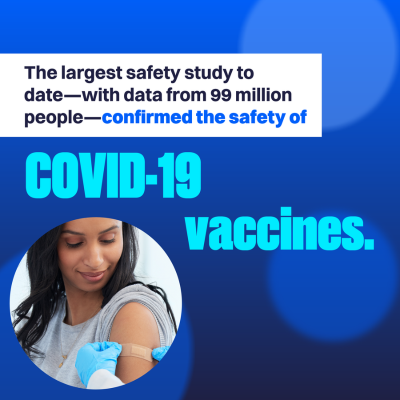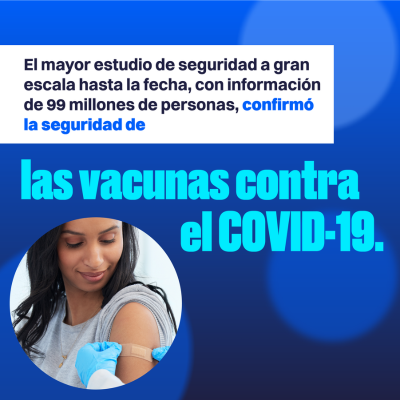Global vaccine safety misused to fuel an anti-vaccine narrative
Scientific research is an important part of better understanding the safety and effectiveness of COVID-19 vaccines and is vital to help shape public health. But in the wrong hands, even legitimate data can be distorted. In just the last few weeks, data supporting additional protection for high-risk populations, national vaccine safety monitoring data, and a large-scale global safety study were misused to promote an anti-vaccine message. These narratives—based on deliberate misrepresentations of credible sources—may further damage confidence in vaccines, which has declined in recent years.
For even more resources, check out the menu above for real-time insights, training resources, and more. Specifically curated for doctors and other health care providers, these links provide actionable content to help navigate today’s information landscape.
Trending narratives from the past month
Controversy surrounds updated CDC COVID-19 guidance
Recent changes to the CDC’s COVID-19 guidance garnered online criticism from vaccine opponents and those who feel the agency isn’t doing enough to protect high-risk populations. The CDC consolidated guidelines for respiratory viruses, including decreasing COVID-19 isolation time, which some online deemed “reckless.” The agency also recommended an additional COVID-19 vaccine dose for adults 65 and older, leading some vaccine conspiracists to claim that the advice is designed to harm seniors before the upcoming election. The negative response to the updated guidance indicates a waning trust in health officials, which may lead to opposition to future public health recommendations. Read the fact checks here and here.
Politicians weaponize hearings to attack COVID-19 vaccines
In February, a congressional committee held a hearing on federal vaccine safety systems that questioned the FDA’s investigation of deaths potentially linked to COVID-19 vaccines. Several viral posts about the hearing used data from VAERS—the federal vaccine safety monitoring system—to claim that federal officials are no longer monitoring COVID-19 vaccine safety. Soon after, a U.S. senator hosted a roundtable discussion with a panel of so-called “experts” featuring many prominent anti-vaccine figures and conspiracy theorists. The event promoted numerous false claims, including that mRNA vaccines contain harmful undisclosed DNA contamination and that governments are covering up excess deaths allegedly caused by mRNA vaccines. Read the fact checks here and here.
Global vaccine safety study fuels anti-vaccine narrative
A recent global safety study, the largest to date, assessed COVID-19 vaccine safety using data from 99 million people across eight countries. The study confirmed a slightly increased risk of several previously reported adverse reactions, including myocarditis and pericarditis following mRNA vaccination and Guillain-Barré syndrome following viral vector vaccination. The study circulated online for weeks with the false narrative that it “proves” COVID-19 vaccines are unsafe. Notably, these claims contradict the study’s findings and the researchers’ conclusions. Read the fact checks here and here.
What you might say in response
As the COVID-19 pandemic has evolved, so have public guidelines. Updated CDC recommendations reflect that.
- Older adults are the most vulnerable population to COVID-19. COVID-19 continues to hospitalize and kill thousands every week, the vast majority of them people 65 and older. Last year, people 65 and older made up over 85 percent of all COVID-19 deaths.
- The 2023-2024 monovalent vaccine dramatically decreased the risk of COVID-19 infection and hospitalization in high-risk adults. Older adults should consider getting an additional dose this spring to increase their protection.
- The CDC did not claim that COVID-19 is the same as the flu but rather confirmed that it is a “more serious illness and leads to more lasting effects.” The agency advises people to take similar precautions for COVID-19 as for the flu and RSV, including staying up to date on vaccination and isolating until symptoms improve.
Claims that COVID-19 vaccines cause widespread health concerns are not based in reality, as evidenced by over three years of research showing that the vaccines are safe.
- In the more than three years since the vaccines’ rollout, with more than 70 percent of the world having received vaccines, there has never been any evidence of widespread safety concerns. In fact, there is strong evidence the vaccines are safe and help protect against severe disease.
- Health authorities in the U.S., EU, Australia, and Canada have confirmed that any residual DNA present in COVID-19 is well within a safe range and meets international quality standards.
- The claim that COVID-19 vaccines are linked to millions of deaths has been thoroughly debunked. Moreover, global data contradicts the claim that COVID-19 vaccines cause excess deaths, including a 2023 analysis of data from 178 nations that found that higher COVID-19 vaccination coverage was associated with lower all-cause mortality rates.
The largest global safety study to date confirmed the safety of COVID-19 vaccines and the extreme rarity of serious adverse reactions.
- The study confirmed that serious risks associated with COVID-19 vaccines are extremely rare, such as the seven cases of brain inflammation from over 36 million Moderna vaccinations. These findings further disprove the false narrative that COVID-19 vaccines cause widespread death and serious health complications.
- The study’s large scale allowed researchers to detect risks that smaller studies may miss because they are so rare.
- Numerous large-scale studies have established the safety of COVID-19 vaccines and confirmed that the benefits of vaccination far outweigh the exceedingly small risk of serious adverse events.
What we’re reading
- Boston University: POV: Health Misinformation Is Rampant on Social Media
- Johns Hopkins: A new playbook for addressing health misinformation
- The Conversation: Algorithms are pushing AI-generated falsehoods at an alarming rate. How do we stop this?
Studies and trainings
- Frontiers in Public Health: What is the impact of artificial intelligence-based chatbots on infodemic management?
- Journal of Medical Internet Research: The Role of Social Media in Knowledge, Perceptions, and Self-Reported Adherence Toward COVID-19 Prevention Guidelines: Cross-Sectional Study
Interested in learning more about how to debunk false claims with patients? Check out the new Infodemiology Training Program. In videos that range from 5 to 10 minutes each, the program introduces health care providers to the basics of infodemiology and provides you with actionable skills to help improve patient care.
Quick-response media assets
Below, we've provided a social media asset in English and Spanish. These assets can be used on social media to fight false claims and help provide your network with accurate information. Just right-click the asset, or press and hold on mobile, to download.

Proposed social copy:
A recent global safety study, the largest ever conducted for COVID-19 vaccines, found that serious adverse reactions after vaccination are extremely rare. The analysis identified several previously identified COVID-19 vaccine risks and confirmed the extreme rarity of these adverse reactions. This study is just the latest to show just how safe COVID-19 vaccines are.

Publicación propuesta:
Un reciente estudio de seguridad global, el mayor jamás realizado sobre las vacunas contra el COVID-19, encontró que las reacciones adversas serias después de la vacunación son extremadamente raras. El análisis identificó algunos riesgos identificados previamente de la vacuna contra el COVID-19 y confirmó la extrema rareza de esas reacciones adversas. Este estudio es solo el último en demostrar cuán seguras son las vacunas contra el COVID-19.
Powered by PGP in partnership with the ABIM Foundation.
